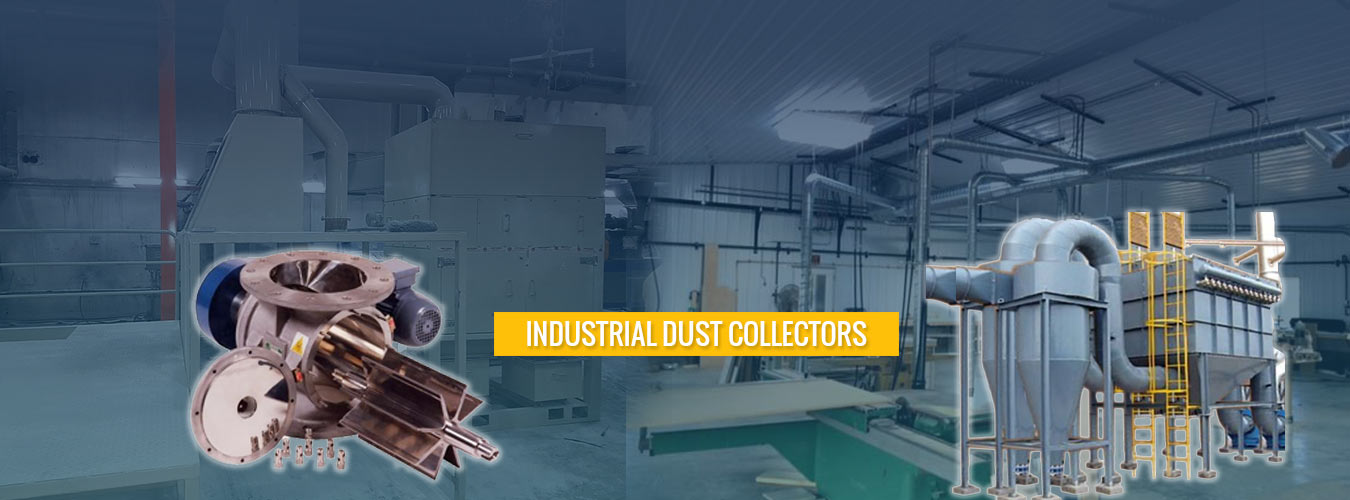Dust Collector
Prism Tech Engineering LLC is a leading Dust Controller Manufacturer in UAE that offers the Variety of Dust Controller for many industrial activities. Our controller’s primary goal is to capture and Stop them from getting suspended in the air.
Dust collection is a vital process for coal handling, cement fabrication, metal fabrication, mining, chemical processing, woodworking, pharmaceuticals, recycling, and agricultural industries, among many others. Industry-specific state OSHA regulations require companies to hold their facilities to strict standards for indoor air quality, and the EPA and other regulatory bodies put limits on emissions of dust, smoke, and fumes into the atmosphere.
Dust collectors play a major role in helping companies meet these requirements and improve both indoor and outdoor environments by capturing a high percentage of the particles emitted by industrial processes.

- Mining and Quarrying
- Construction
- Cement Production
- Power Generation
- Food Processing
- Pharmaceuticals
Benefits OF Dust Controller
For Environment: The Dust Controller addresses several problems by managing dust distributions this solution contributes to the environment’s protection and human health.
- Avoiding Air Pollutions
- Soil and Water Pollution Control
- Climate change mitigation
- Wind erosion control
For Industrial: The Dust controller plays an important role in solving various problems in industrial operations, Boosting operational efficiency, safety, compliance, etc…,
- Equipment Maintenance and Performance
- Product Quality and Consistency
- Worker Comfort and Productivity
- Fire and Blast Vulnerabilities
Prism Tech Engineering understands the importance of maintaining a clean and safe environment both industrial and environment, our high-quality products and long-term solutions meet the we growled the Best Dust Controller Supplier in UAE.
Types of dust collector
Industrial dust collection systems are divided into a few big groups, including fabric filters and inertial separators. Fabric filters include systems like fabric filter baghouses and jet dust collectors, while inertial separators include systems like cyclone dust collectors.
Other miscellaneous dust collecting systems include wet dust collectors, cartridge collectors, small dust collectors, portable dust collectors, downdraft tables and shop vacs.
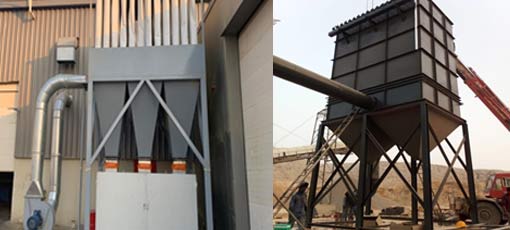
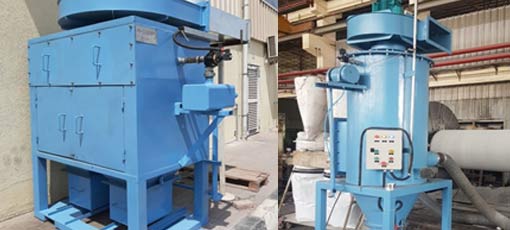
- Automatic Reverse pulse jet Cartridge type dust collectors
- Heavy Duty Bag Type Reverse Pulse Jet type
- Shaker Mechanism Type
- Portable dust collector
- Wet Type
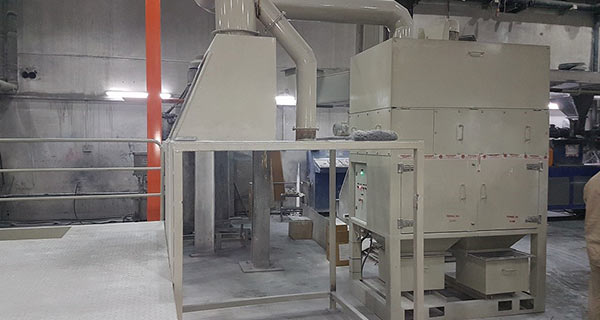
Fabric filters are those dust collecting systems that can capture dust particles when they pass through fabric material filters. Such filters are usually made from woven cotton, felted cotton, glass fiber, or something similar. Fabric filters are extremely efficient and effective, with a collection rate of over 99% for fine particles. The most common type of fabric filter is the baghouse.
Baghouses, or baghouse dust collectors, are the most common dust collector design and are often the most cost-effective. Baghouses work by drawing contaminated air in through ducts to a hopper-shaped baghouse. A vacuum-creating fan then pulls the air through the fabric filters contained inside the baghouse. (They are made of cotton, synthetics, or glass-fiber.) The fabric bags catch the dust, smoke, and various other particles, so that the air may exit as clean air exits through the fan at the outlet.
The dust particles that are left behind either cling to the filter or settle into an airlock at the bottom of the hopper, which is routinely emptied.
As a cake of dust accumulates on the filter, it actually increases the effectiveness of the filter for trapping tiny particles. After a point, however, the filter cake can become too thick and begins to stress the system, so occasional cleaning is necessary to ensure sufficient airflow through the filters. For this reason, baghouse dust collectors are sometimes equipped with vibrators that shake filters free of dust.
Pluse Jet Cleaning dust collectors are a type of baghouse dust collector. To perform filter cleaning, they use jets of compressed air that blow the dust-caked fabric bag filters free of excess dirt.
Inertial separators are dust collectors that do not rely on filters but instead rely primarily on gravity and inertia. They use gravity and inertia to separate dust from gas streams. After they isolate the dust, they usually drop it into a storage hopper. They are most effective at removing the coarser dust particles from contaminated air. Examples of prominent inertial separators include cyclone dust collectors, multi-cyclone dust collectors, settling chambers, and baffle chambers.
Cyclone dust collectors use centrifugal force, or cyclonic air movement, within a hopper-shaped chamber to separate particles from the air. The particles, being heavier than air molecules, are thrown against the outer wall of the hopper and fall to the bottom, where they are collected. Cyclone dust collection systems are common in a number of different industrial settings.
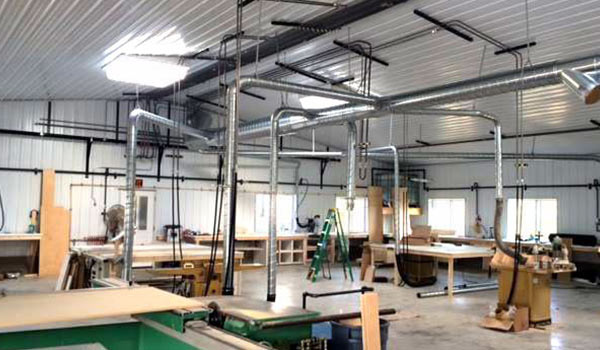
Cartridge dust collectors are small and compact types of dust collector. A fan is used to move air and dust into the cartridge dust collector. The air passes through the filters, but dust and particles remain outside. Cartridge filters are ideal for applications such as welding, laser, and plasma cutting fumes because they can handle very small particles. Grain and feed dust, fine wood dust, fiberglass, and shot blasting are all industries where they excel. Cartridge dust collectors have a much higher airflow than baghouse filters, allowing them to cover a much larger area. They also require less frequent checks than bag filters.
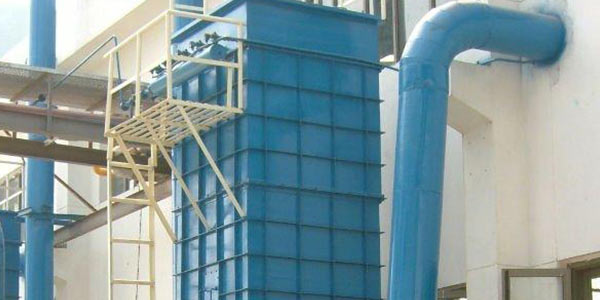
Small dust collectors are those dust collectors designed specifically to fit in tight spaces. With them, users can maintain air quality even in the smallest and most inconvenient of spaces.
Portable dust collectors, also known unit dust collectors, are smaller, self-contained dust collectors. In order to provide localized dust collection, users can easily move these air cleaners from place to place. They generally use either fabric filters or cyclonic motion to collect particles. Operators can either install them in addition to a larger system, or in place of a larger system. Portable dust collectors are small, inexpensive, and perfect for small spaces.
Downdraft tables are work tables that feature built-in dust collection equipment. This equipment is designed to filter the metal and wood dust from processes performed over these tables, such as welding and wood sawing.


